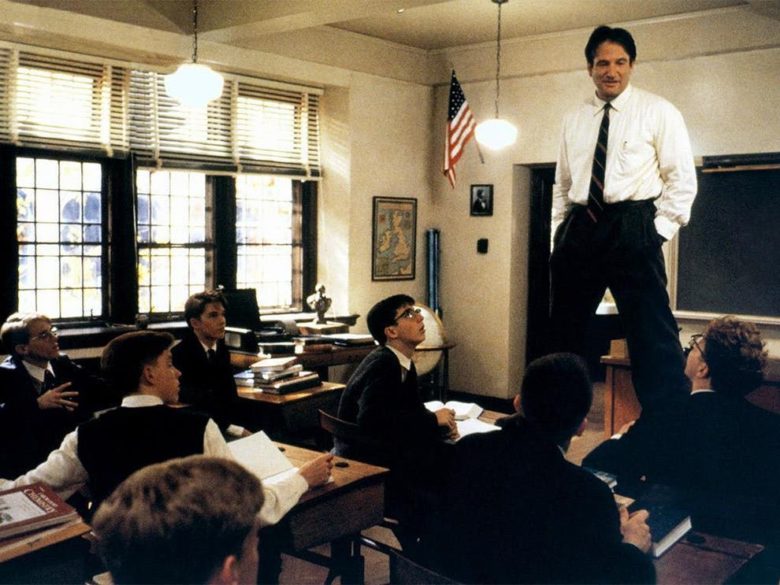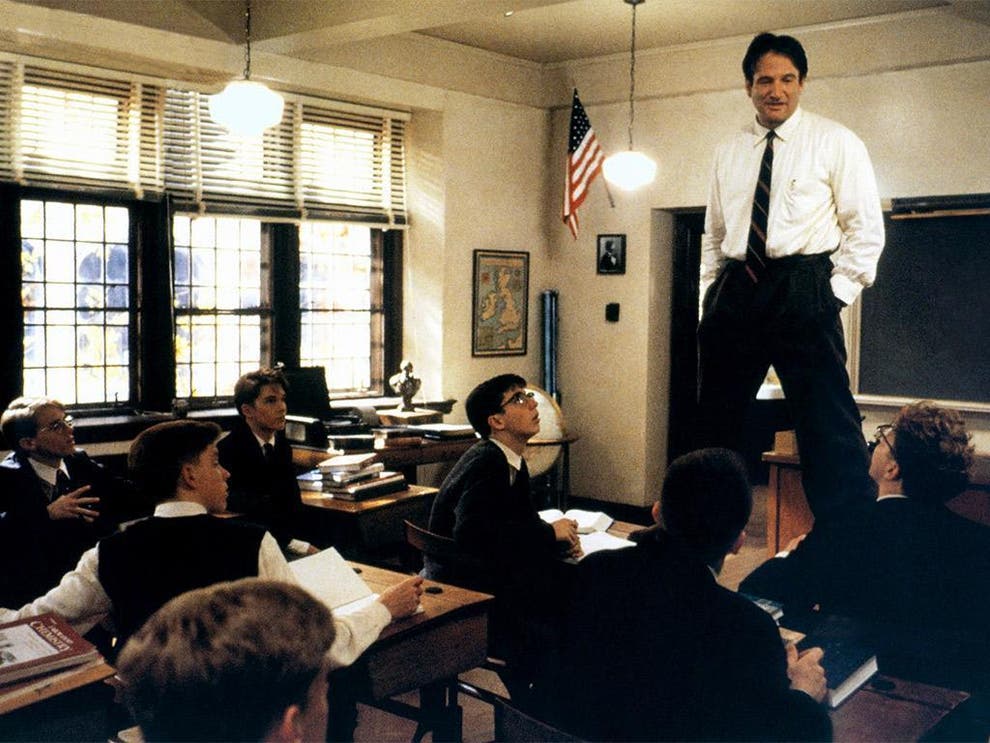
by Charlie Trimm | Talbot School of Theology & Brittany Kim | North Park Theological Seminary
While some might view it as a “step down,” teaching the Bible in a Christian high school plays an important role in the formation of many teenagers. The pay is lower than teaching in a college or seminary setting, but the rewards of working with teenagers can be high.
Dr. Austin Freeman
Upper School Literature Teacher | Founder’s Classical Academy of Mesquite (Mesquite, TX)
My doctorate is in systematic theology, though I now do research primarily in theology and literature. I teach at a classical charter school, and during the hiring process a PhD immediately makes an applicant a bigger fish in a smaller pond. Since secondary education offers compensation packages based on years of experience and qualifications, I was immediately placed in the highest pay bracket (equivalent to the assistant headmaster), even without any teaching experience. Pay rates are lower at many private Christian schools, but classical and/or charter schools receive funding from the state and so are virtually equivalent to teaching in a public school. Additionally, the curricula for classical schools are similar or identical to the curricula for many Christian honors colleges. I teach or have taught the Iliad, Aeneid, Metamorphoses, Oedipus cycle, Bacchae, Beowulf, Canterbury Tales, Gawain & the Green Knight, Divine Comedy, Paradise Lost, Pride & Prejudice, and Henry V in the core curriculum. I teach Lord of the Rings, the New Testament, and moral philosophy as electives or dual-credit courses. I also teach rhetoric and the senior thesis research paper.
Depending on individual skill, preparation is much less demanding than lecturing for a college or seminary course. As such, I personally have lots of time to pursue writing projects in academia. In the three years since I began working here, I have completed a large monograph, two journal articles, and five peer-reviewed chapters, and am currently editing two books. I am simultaneously free from the perils and pressures of the tenure committee and the publish-or-perish paradigm. I research and publish what I want when I want, all while leading seminar-style classes with many bright students. I teach five periods (>4hrs) a day, alongside many faculty duties. I also run the school Dungeons & Dragons club twice a week during lunch.
Jobs like this are abundant and applicants can take their pick of where they want to live, rather than being forced into whichever location happens to have the rare opening at the time. I also take pride in the fact that I am preparing and shaping students before their worldviews have begun to ossify in college.
Dr. Tyler Yoder
Instructor of Humanities | Culver Academies (Culver, IN)
I had life mapped out:1
1. Follow B.A. with an M.A.
2. Present at conferences and publish in top-tier journals.
3. Complete a PhD and arrive at the glorious destination of a tenure-track university post teaching a 3-3.
I inherited this career map from others and followed it sedulously. The destination, however, was elusive. If the standard PhD to tenure-track post represents the litmus test for success, count me a failure.
As I finished coursework, presented papers at SBL, discussed research with peers and professors, submitted essays to journals, finished a dissertation, and secured interviews before graduation, the focus remained fixed on that tenure line destination. The trip was on course; all roadways appeared clear. But reality would eventually set in. With every passing year, as the SBL jobs report honestly informed me, the pickings grew slimmer, and the competition grew more competitive as the surplus of starving PhD’s duked it out for a few golden tickets. I knew I wasn’t the only desperate traveler left on the outside looking in. But I had never oriented my vision to consider an outcome different from a tenured professorship. There were rumblings of PhD’s in the humanities across the country seeking out bureaucratic jobs or going into business. (Business? Wasn’t that located somewhere between the third and fourth circles of hell?) I listened surreptitiously to the stories I heard, feeling woefully unequipped to know where to start. On the heels of the devastating blow of a failed campus interview, an existential crisis hit. Questions that cut to the core of who I am bubbled up in me. If my definition of success was being a professor…
… have I wasted the last decade of my life?
… how do I explain this to my family? Can I even provide for them?
… what does this say about me as a person, not to mention a scholar?
… is there any way to salvage or, dare I say, redeem this “closed door?”
It just so happened that our flat in Baltimore stood a stone’s throw away from a private secondary school. In the midst of my crisis, I was reminded of this institution and reached out to a friend who had connections in the Baltimore independent school network. What ensued was a conversation that captured my interest but did not relieve my doubt and shame. This was a high school, not Johns Hopkins.
The possibility led me to consider another opportunity at a boarding school in the Midwest. I somehow ended up on campus, fielding what seemed like a merciless barrage of questions from faculty and teaching a lesson on debt peonage in the ancient Near East (obviously!) to a surprisingly curious collection of sixteen-year-olds. Many questions revolved around instruction, each one a jolt. Others focused on ideas—big, complex, and captivating ideas— that I could already imagine integrating fruitfully in a classroom by drawing on my own training.
Even after interviewing and receiving an offer, doubts inside my head lingered about being a high school teacher and the “waste” of my training. I wouldn’t be teaching courses on Hebrew or Akkadian, ancient Near Eastern history, or Western Civilization. But as I read the required texts for this course during the summer before my new position began, I was invigorated by ideas and questions that presupposed and applied the fundamental questions we study in the humanities, and to which I had devoted more than a decade of postsecondary education.
The rest is, as they say, history. I am now in the middle of my fourth year as an instructor of humanities. Looking back on my serpentine journey, I’m humbled by the journey itself and the process of personal exploration, doubt, regret, expectations, and decision-making.
Instead of teaching undergraduate surveys, upper-level electives, or graduate seminars on field-specific subject matter on a university campus, I now facilitate learning environments that track comparable material for students several years younger. Along the way, I’ve been empowered to learn alongside my students and partner with brilliant, like-minded colleagues, acquiring the equivalence of a practical M.Ed. We read, discuss, and debate texts together, prompting vulnerability in productive learning spaces. We observe one another teach. We foster cross-class experiences, where students dramatize plays, participate in writing workshops and symposia, and learn from teachers who contemplate what class could and should be, not out of necessity but the thrill and heuristic benefit of collaboration. At the same time, the institution champions the autonomy of individual instructors.
Such autonomy has offered me the freedom to integrate familiar, specialized material into my upper-level classes (e.g., Genesis; the Epic of Gilgamesh), which has, in turn, expanded my interests in different directions (e.g., Kierkegaard; the Bhagavad Gita; behavioral economics). In core humanities courses, I am encouraged to think creatively and introspectively about the learning experience I facilitate. Over the last three years my students have scrutinized Shakespeare’s The Merchant of Venice through the lens of a social history of antisemitism, considered the way mortuary archaeology can help explain the symbiosis between living and dead in Achebe’s Thing Fall Apart, assessed the impact of power structures on human behavior in Khadra’s The Swallows of Kabul, and debated conceptions of moral philosophy in Sandel’s Justice. Readings in the Hebrew Bible, New Testament, and Qur’an have combined with short stories from Flannery O’Connor or Ursula K. Le Guin to complicate their thinking about the nature of the good life. And I’m grateful for the freedom to teach just two classes at any given time during the year, freeing me up to spend time researching, writing, and enjoying a young family. The school has sent me to SBL’s Annual and International Meetings, regularly tracked down obscure sources, and supported my professional development and interests.
I’m not preparing for a traditional tenure-review process or teaching a slate full of field-specific classes. I don’t have my own college campus office and students don’t address me grandiloquently as “Professor Yoder.” And that’s okay. I teach classes in which discussions regularly pivot on complex ethical, religious, and sociopolitical matters. Since we live on campus, I’m never far away from those I love the most. The giggles and hugs I receive from my children after class each day when they come to walk me home likewise weren’t expected. This is part of a critical redefinition of success to me now. These moments reveal a fuller map—with roads I had previously disregarded—where joy from a less self-centered kind of journey off the beaten path has replaced the happiness that comes from scaling a narrow, contrived mountain that I let myself and others tell me was the only summit.
Charlie Trimm is Associate Professor and Chair of Old Testament (Undergraduate Division) at Talbot School of Theology, Biola University. The testimonials above were first published on his blog. Brittany Kim teaches Bible classes at North Park Theological Seminary.




